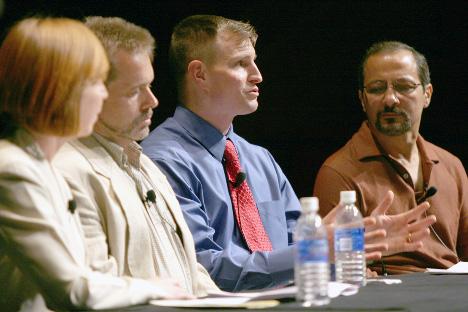
Rob Fisher
An estimated 100 students and members of the public attended a panel discussion called, “Permission to Speak Freely? Media Coverage of the war in Iraq,” according to N.C. State’s Society for Collegiate Journalists, which hosted the event.
The audience listened to four speakers discuss the media coverage on issues involved in the Iraq War. These speakers included Mohamad Ali, an Iraqi native, Jay Price, a reporter who was embedded in Iraq three times, Major Jeff Roberston, an officer that served in Afghanistan and Iraq, and Melanie Sill, executive editor of The News & Observer.
“This panel is important because the public confidence [of adequate news coverage] has dropped in recent years,” Anne Bigelow, professor of philosophy and religion and moderator for the event, said.
According to Bigelow, 52 percent of Americans reported this year to have no confidence of the media coverage about the Iraq War in today’s newspapers and other media outlets.
Sill said she feels people do not understand the war in Iraq. She said she is not an expert on the war, and receives all of her information from the newspaper.
The N&O attempts to cover the stories to provide only a context of what is occurring in the war, according to Sill.
“There are many places people can go for national news, but not for local news,” Sill said.
Sill said The N&O focused on how the war affects people in North Carolina because of the large military presence in the state with the largest Army base in the world in Fayetteville and the Marine Corps base, Camp Lejeune, in Jacksonville.
“We look for stories about people and families, so we can look at it in human terms,” Sill said.
Ali said he felt the media lacked significant coverage of the human side for Iraqis by not writing stories about Iraqi families and people.
“The life of the Iraqi people is what the American people are not getting,” Ali said. “They get glimpses, but the overall picture is not there.”
Price said covering any news in Iraq is difficult because of the terrain, available resources and the safety to tour parts of the country.
“You feel [as a reporter] the weight on your shoulders to bring a story back,” Price said.
Despite the difficulty to report news from Iraq, Sill said she always has volunteers on her staff to report stories.
“The basic point of reporting is to tell people what happened,” Sill said.
The reporters who are sent overseas are there to write about particular events versus a general story about the Iraq War, according to Sill.
Robertson met several reporters while on his tour in Iraq and Afghanistan, and he said he feels each reporter has a different objective and style of reporting, which can ultimately affect the types of coverage in the media.
As an example, Robertson said a reporter from The Washington Post “constantly hit me in the back of my helmet to ask what was happening,” while the reporter was embedded with Robertson’s unit. Robertson said another embedded reporter did not ask a single question in his duration with Robertson’s unit.
Price was embedded in Iraq twice in 2003 with the Army’s 82nd Airborne Division and once in Afghanistan in 2005.
To obtain other perspectives, Price said reporters had various methods, including talking to “stringers,” which were local Iraqis who shared their experience and knowledge in events that took place.
Such translations and methods of gathering information are a “challenge journalism faces,” according to Price.
Caitlyn Redding, a freshman in animal science, said she attended the discussion to learn more about the war, and she said she felt the panel discussion was helpful in learning about the different perspectives from first-hand experiences.
“You have to have the desire to find the news these days because the war is on the back burner,” Redding said.
Nic Pilley, a senior in political science and an Army ROTC cadet, said he felt hearing different perspectives on the coverage about the war was interesting.
He said he plans on commissioning on May 12 as a second lieutenant in the Army. He said he has the possibility of being deployed with his engineering corps unit, which is currently serving in Iraq.
In addition to training with ROTC, Pilley prepared to be deployed to Iraq by taking courses in Arabic and taking courses to learn about the Islamic culture.
Pilley said he felt the public’s understanding of the war is affected by not taking the time to read newspapers or other media sources.
“Newspapers are a good stepping stone, but you just don’t get it from one source,” Pilley said.